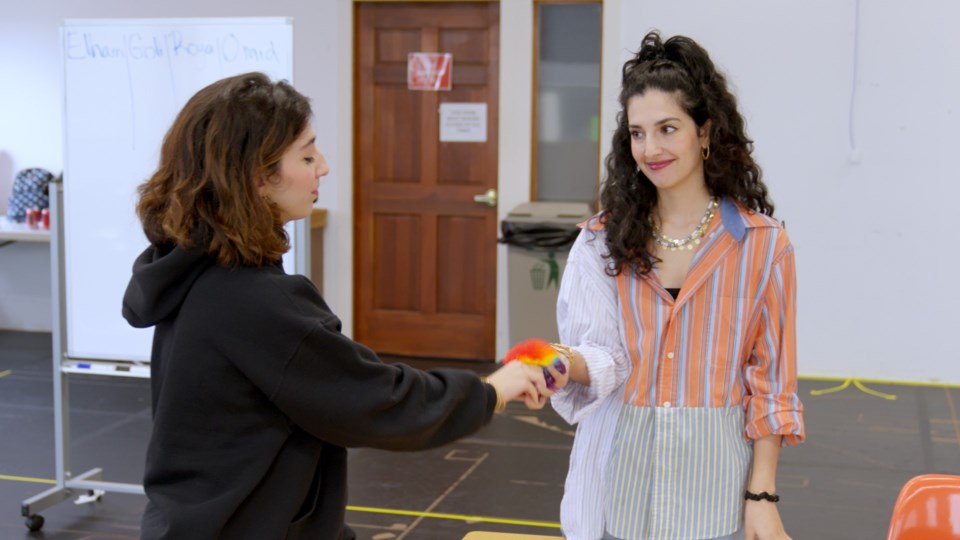NEW YORK (AP) — Theatergoers seeing the Pulitzer Prize-winning play “English” at the Barrington Stage Company will have a treat this fall. They'll get to see the playwright up on stage.
Sanaz Toossi steps into the role she wrote as one of four Iranian students preparing for an English language exam over several weeks in a storefront school near Tehran.
“I’ll be the first to say I make fun of actors all the time. So then playing this role has been humbling in the best way,” she says, laughing, between rehearsals. The production in Pittsfield, Massachusetts, runs from Sept. 27–Oct. 15.
“English” explores the ways in which language shapes identity, can help people feel understood or misunderstood and the push and pull of culture. It's funny, tender and sharp, all at the same time.
“I’ve honestly just had to forget that I wrote the play,” says Toossi. “I just can’t use my playwright brain right now. I think it would be impossible to do this play. I can’t be the writer in the room.”
Toossi, an Iranian American from Orange County, California, graduated with a master’s from New York University. She was a theater kid growing up and featured in a regional production of “A Christmas Carol” playing Martha Cratchit.
“English” — written in the wake of then-President Donald Trump’s ban on travelers from several predominantly Muslim countries — premiered off-Broadway at Atlantic Theater Company in 2022. It has also played Washington, D.C.’s Studio Theatre. The latest production co-stars veterans of the play from those shows.
“I love that you have to release something you’ve written into the world. I have found pleasure in ceding control of my version of the thing. I love that there’s such a mystery in what we do. And every production has taken ownership of the play,” she says.
Last year, Toossi stepped into her play “Wish You Were Here” for one night when an actor was stricken by COVID-19. “I was only in two scenes, and I think I added five minutes to the runtime,” she says, laughing.
“I had a blast on stage. So it’s been fun to jump back into acting with my own play with this cast and creative team, who I know very well. It feels very safe.”
The play is packed with cultural references — like to Christiane Amanpour, “Whenever, Wherever” by Shakira, and Hugh Grant. One character admires Julia Roberts’ teeth, saying “They could rip through wire. In a good way.”
“This play is not for just Iranians and not just for people who are learning a new language,” she says. “It’s just for honestly anyone who at some point has opened their mouth, said something and it’s come out the wrong way.”
Toossi will play Elham, a 28-year-old student who is spiky and anxious to pass the Test of English as a Foreign Language so her provisional acceptance at an Australian medical school can become official.
“I think she’s so angered by the injustice of it all that she has to leave and that to leave she has to learn this new language and in pursuit of that new language, she sounds like an idiot,” says Toossi.
“I’m just really familiar with the feeling of hearing something come out of your mouth, knowing that’s not exactly what you meant and seeing the unintended consequences of what you just said reverberate throughout the room.”
The script calls for the play to be performed with a running time “no less than 90 minutes and no more than 105 minutes.” That's Toossi's attempt to signal to directors the mood of the piece — not a two-hour dark drama and not a quick farce.
“It should not feel too sad, but it also shouldn’t be played as like a broad comedy,” she says. “This is not a play about sad, depressed Iranians. It’s a play about people really trying to make themselves understood and the failures are often funny.”
Winning the drama Pulitzer this year puts her in the company of August Wilson, Edward Albee, Eugene O’Neill, Arthur Miller and Tennessee Williams. Toossi says the win has relieved some pressure on her going forward.
“I take such pleasure in winning this award once. I don’t feel the need to ever win it again. So I am going to try and relieve myself of the burden of writing a play that everyone likes,” she says.
“When I wrote this play, I didn’t think anyone would do it, let alone that it would win a Pulitzer. So as much as I can, I want to try to return to that mode of writing where it’s just for me.”
She's also found that there are other benefits to winning a Pulitzer, albeit much smaller ones. “My dentist is so much nicer to me now,” she says, laughing. “He really waits for the numbing shot to set in.”
___
Mark Kennedy is at http://twitter.com/KennedyTwits
Mark Kennedy, The Associated Press



